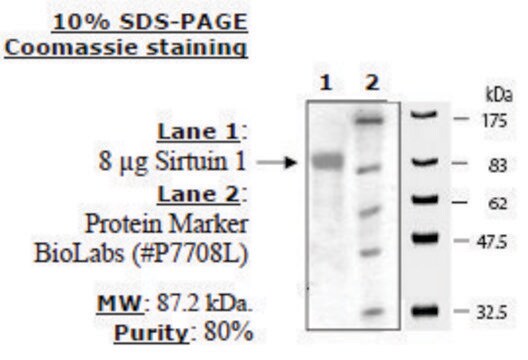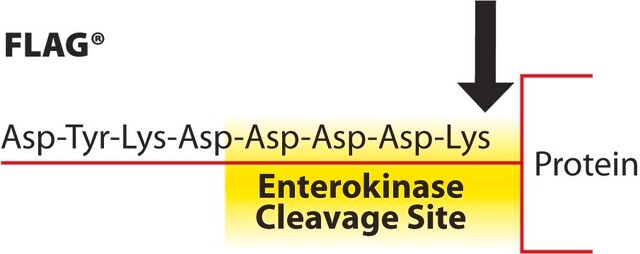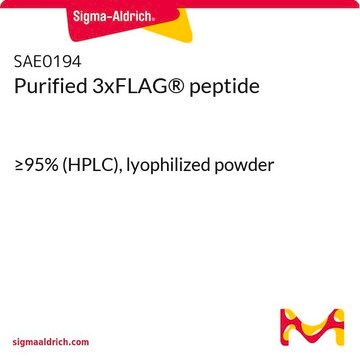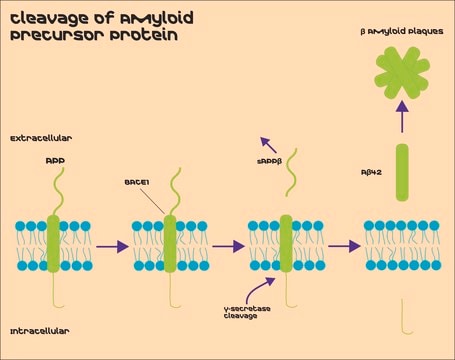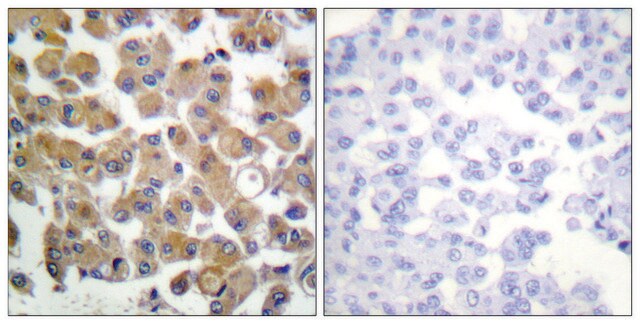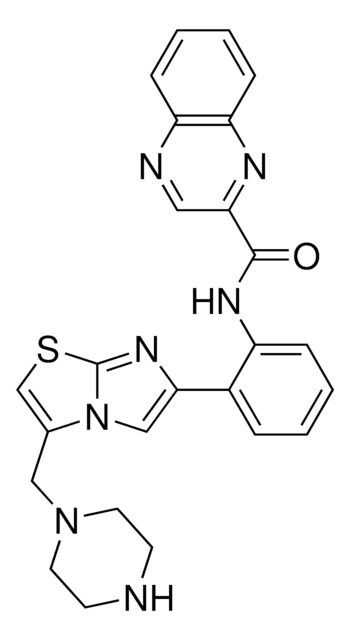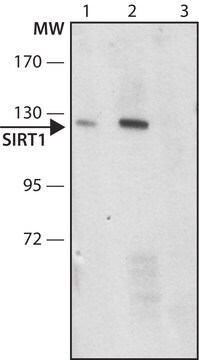CS1040
SIRT1 Assay Kit
sufficient for 100 assays
Synonyme(s) :
SIRT1 Activity Assay
Se connecterpour consulter vos tarifs contractuels et ceux de votre entreprise/organisme
About This Item
Code UNSPSC :
12161503
Nomenclature NACRES :
NA.84
Produits recommandés
Utilisation
sufficient for 100 assays
Niveau de qualité
Conditions d'expédition
dry ice
Température de stockage
−20°C
Informations sur le gène
human ... SIRT1(23411)
Catégories apparentées
Description générale
The SIRT1 Assay Kit offers all the reagents required for the measurement of purified SIRT1 activity and for screening of inhibitors/activators.
The assay procedure is based on a two-step enzymatic reaction. The first step is deacetylation by SIRT1 of a substrate that contains an acetylated lysine side chain. The second step is the cleavage of the deacetylated substrate by the Developing Solution and the release of a highly fluorescent group. The measured fluorescence is directly proportional to the deacetylation activity of the enzyme in the sample.
The assay procedure is based on a two-step enzymatic reaction. The first step is deacetylation by SIRT1 of a substrate that contains an acetylated lysine side chain. The second step is the cleavage of the deacetylated substrate by the Developing Solution and the release of a highly fluorescent group. The measured fluorescence is directly proportional to the deacetylation activity of the enzyme in the sample.
Application
SIRT1 Assay Kit has been used in measuring the Sirt1 deacetylase activity in mesenchymal stem cells (MSCs), human retinal endothelial cells (HRECs) and human neuroblastoma SH-SY5Y cells.
Actions biochimiques/physiologiques
Sirtuins (Sir2) are an evolutionarily conserved family of NAD+ dependent histone/protein deacetylases that tightly couple the cleavage of NAD+ and the deacetylation of protein substrates. The reaction products are nicotinamide, the deacetylated product, and a novel metabolite, 2′-O-acetyl-ADP-ribose. The proteins within this family are named after the first protein discovered from this family, Sir2 (Silent Information Regulator 2). Besides gene silencing, sirtuin proteins are important in other processes such as cell cycling regulation and fatty acid metabolism. SIRT1 is the human homolog of Sir2 and the one most studied to date. SIRT1 mediates p53 dependent process, transcription regulation, muscle differentiation, adipogenesis, and protection from axonal degeneration. SIRT1 also participates in early embryogenesis, neurogenesis, and cardiogenesis.
Caractéristiques et avantages
The kit offers all the reagents required for the fast and easy measurement of purified SIRT1 activity and for screening of inhibitors/activators. Moreover, the kit contains an inhibitor (nicotinamide) and an activator (resveratrol) as negative and positive controls, respectively.
Composants de kit également disponibles séparément
Réf. du produit
Description
FDS
- SIRT1 Substrate (Fluorometric) 100 μL
- Developer Solution 1.5 mL
- S8446SIRT1 human, recombinant, expressed in E. coli, N-terminal histidine tagged, ≥90% (SDS-PAGE), buffered aqueous glycerol solution 150 μgFDS
- NAD+ Solution 1 mL
Produit(s) apparenté(s)
Réf. du produit
Description
Tarif
Code de la classe de stockage
10 - Combustible liquids
Point d'éclair (°F)
188.6 °F
Point d'éclair (°C)
87 °C
Faites votre choix parmi les versions les plus récentes :
Déjà en possession de ce produit ?
Retrouvez la documentation relative aux produits que vous avez récemment achetés dans la Bibliothèque de documents.
Les clients ont également consulté
Haiyan Chu et al.
American journal of respiratory cell and molecular biology, 58(1), 28-39 (2017-08-12)
Pulmonary fibrosis is the leading cause of death in systemic sclerosis (SSc). Sirtuin1 (SIRT1) is a deacetylase with known antiinflammatory and antifibrotic activity in the liver, kidney, and skin. The role of SIRT1 in SSc-related pulmonary fibrosis is unknown. In
Flávia Gerelli Ghiraldini et al.
Molecular biology of the cell, 24(15), 2467-2476 (2013-06-14)
Hyperglycemia, like aging, induces chromatin remodeling in mouse hepatocytes in comparison to normoglycemia and younger age, respectively. Changes in glucose metabolism also affect the action and expression of sirtuins, promoting changes in chromatin conformation and dynamics. Here we investigate the
Kai Le et al.
International immunopharmacology, 75, 105779-105779 (2019-07-31)
Neonatal hypoxic-ischemic brain injury (HIBI) is a knotty disease that lacks appropriate treatment. Inflammation is an important contributor to brain damage, and microglia are responsible for eliciting early and pronounced inflammatory reactions in the immature brain after hypoxic-ischemic (HI) insult.
Yue Liu et al.
The Journal of experimental medicine, 213(11), 2473-2488 (2016-11-05)
Abdominal aortic aneurysm (AAA), characterized by a localized dilation of the abdominal aorta, is a life-threatening vascular pathology. Because of the current lack of effective treatment for AAA rupture, prevention is of prime importance for AAA management. Calorie restriction (CR)
Jun Zhang et al.
Biochimica et biophysica acta, 1861(7), 1715-1728 (2017-03-17)
Myocardial fibrosis contributes to cardiac dysfunction. Astaxanthin (AST), a member of the carotenoid family, is a well-known antioxidant, but its effect on and underlying mechanisms in myocardial fibrosis are poorly understood. In vivo, myocardial fibrosis and cardiac dysfunction were induced
Notre équipe de scientifiques dispose d'une expérience dans tous les secteurs de la recherche, notamment en sciences de la vie, science des matériaux, synthèse chimique, chromatographie, analyse et dans de nombreux autres domaines..
Contacter notre Service technique
